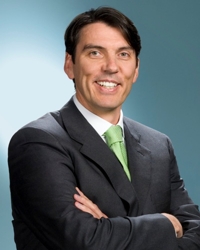AOL CEO Tim Armstrong has been evangelizing for programmatic advertising, where ads are purchased in an automated, data-driven way, usually through real-time bidding. Now the company plans to host what he says will be the industry’s first upfront event on Sept. 23.
Armstrong, along with incoming AOL Networks CEO Bob Lord and other company executives, discussed their plans at a dinner with reporters last night. On one level, it might seem a bit incongruous to hold an upfront event (where advertisers can make large spending commitments with publishers) for an ad-buying process that’s supposed to be real-time and technology-driven. Or as one of the reporters asked: If programmatic ad buying is so efficient, why hold an upfront at all?
From the perspective of AOL (which owns TechCrunch), there’s an obvious advantage to getting large financial commitments up front. But Armstrong said there are reasons for advertisers to take this approach too. First, it means they can incorporate their programmatic ad-buying into their corporate budget cycles. Second, it allows them to integrate the technology at a large scale. And third, it means they can get access to “corporate exclusives.” In other words, if a company knows that someone is going to be a major advertiser, they’re going to provide access to more resources like engineers.
In fact, Armstrong said AOL is starting to get approached by brands and agencies (four in the past week, apparently) that are looking to make upfront commitments of $50 million or $100 million in programmatic buying.
On the other hand, he said the company has also been met with large customers and seen then make “less-than-educated decisions about what ‘programmatic’ was” so he felt it was important to hold an industry-wide event where advertisers can “sit, listen, and watch.” It sounds like the event’s goals, at least for this year, revolve as much around promotion and education as they do around making big deals.
Armstrong and Lord repeatedly compared their aspirations for the Programmatic Upfront to the Digital Content NewFronts, which over the past few years have become an important industry event. Armstrong added, “I would call this the technology upfronts,” because unlike the NewFronts or a traditional TV upfront, advertisers are “committing to tech platforms” rather than committing to content.
The Programmatic Upfront will be held on the first day of this year’s Advertising Week, and while none of the participants have been announced yet, the company is hoping to attract more than 150 attendees. Armstrong said it’s not meant to be an AOL-only event, and that he’s hoping that other big players like Google and Yahoo will participate, too. And if this spurs other companies to hold their own programmatic upfronts, even better.
The event’s official theme is “Programmatic Explodes Creativity,” which is one of Armstrong’s main arguments — that by removing many of the manual, inefficient aspects of ad buying, programmatic technology can free the industry to be more creative.
That runs against a lot of the fears around automated ad buying, and in another counter-intuitive argument, Armstrong and Lord suggested that it can be good for premium publishers, because it removes a lot of the inefficiencies and unnecessary middlemen. (An AOL slide distributed at the event suggested that due to these inefficiencies, publishers receive only $0.25 to $0.45 for each $1 of advertising spend.) So we might actually see prices for premium ad inventory go up, Armstrong said — not in formats that are “commoditized,” such as normal banner ads, but in areas like video.
Update: You can read more in AOL’s blog post about the event.
